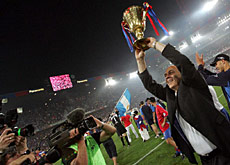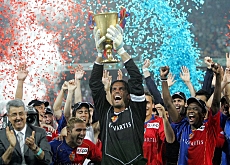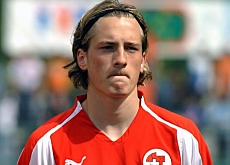Swiss football clubs chase champions Basel

Clubs in the Super League begin a new season on Wednesday, with favourites Basel expected to face a tough fight to retain their title.
While there could be a handover of power at the top this season, there are also changes in the offing at the Swiss Football Association.
With the exception of the 2002/2003 season won by Grasshoppers Zurich, Basel have dominated the Swiss championship since 2001.
They have won three titles, each time with a comfortable lead over the runners-up: Grasshoppers, Young Boys Bern and Thun.
They are unbeaten in 42 games played in their home “den” or St Jakob Park stadium. In Switzerland, there is Basel… and then there are the others.
No let up
And the champions do not intend to ease off this season. Christian Gross, who is beginning his seventh season as manager, does not hide his twin ambitions of qualifying from the group stage of the European Champions League and retaining the Swiss championship.
These aims are not beyond the bounds of possibility. After all, Basel have an annual budget of SFr25 million ($20 million) which is quite simply the highest in the country.
But the champions have seen the departure during the summer of international players Philipp Degen to Borussia Dortmund and Benjamin Huggel to Frankfurt in Germany.
There is also a possibility that captain Murat Yakin may soon be off to Cologne.
Although a formidable opponent, Basel are not unbeatable. Last season “minnows” Thun were for a long time their match before falling apart towards the end of the season.
Bern and Zurich
But over the next few weeks, the principal threat to Basel is not likely to come from the Bernese Oberland but from the cities of Bern and Zurich.
Managed for the past six months by Hanspeter Latour, who worked wonders at Thun, Grasshoppers have the means to fight it out at the top. And so do Young Boys.
In their new stadium, which is due to be officially opened on July 31, the Bernese will soon be able to count on the support of 30,000 supporters – a trump card that cannot be ignored.
But one thing is clear: the championship trophy is unlikely to be returning to the French-speaking part of the country in 2006, where it was last seen in the display cabinet at Geneva’s Servette club seven years ago.
The main concern of both Neuchâtel Xamax – currently embroiled in a financial crisis – and newly promoted Yverdon will be to keep their place among Swiss soccer’s elite. The same goes for Schaffhausen and Aarau.
The remaining three teams in the Super League – Thun, Zurich and St Gallen – will probably not experience the thrills of being among the leaders but won’t have to fear relegation either.
Decisions
Before the end of the season in May, a number of important decisions will be or already have been taken concerning the future of Swiss football.
On the security front, the Swiss Football League has come up with new measures to try to stamp out hooliganism in Switzerland, after serious incidents between the fans of Basel and Grasshoppers among others.
Parliament is also trying to establish a legal framework for punishing outbreaks of soccer violence. This is expected to be approved some time next year.
Swiss soccer authorities have also learned lessons from the financial scandal of Servette, which went bankrupt last season.
The Swiss Football League is to keep a closer on the financial management of clubs and will check that salaries and other social payments are made each month.
Minimum number
It will also work on a project, which will probably be ready by November, to impose a minimum number of players (three to five) who are actually trained in Switzerland.
The free movement of people between Switzerland and the European Union is currently considered a danger to home-grown talent.
In a related development, Swiss soccer authorities have been trying to stop an exodus of the country’s young players.
They welcomed a move by world soccer’s governing body Fifa, which has introduced a regulation stipulating that international transfers of unaccompanied players can only take place if the individuals concerned are over 18 years of age.
The Swiss Football League has said this is a first step but is concerned that Swiss players are leaving the country too early, only to end up on the substitutes’ bench or playing with the reserves of foreign clubs.
swissinfo, Raphael Donzel
Swiss champions honours list:
1. Grasshoppers Zurich have been champions 27 times.
2. Basel: 11 times
2. Young Boys: 11 times.
4. Zurich: 9 times.
5. Aarau: 3 times.
6. Neuchâtel Xamax: twice.
6. St Gallen: twice.
8. Schaffhausen, Thun and Yverdon: none.
There are ten clubs in the Super League, the elite of Swiss football: Aarau, Basel, Grasshoppers Zurich, Neuchâtel Xamax, Schaffhausen, St Gallen, Thun, Young Boys Bern, Yverdon and Zurich.
The opening match on Wednesday features Neuchâtel Xamax at home to Young Boys.
Basel are widely being tipped as favourites to retain the title for a third successive season. Grasshoppers and Young Boys are seen as their main challengers.

In compliance with the JTI standards
More: SWI swissinfo.ch certified by the Journalism Trust Initiative


You can find an overview of ongoing debates with our journalists here. Please join us!
If you want to start a conversation about a topic raised in this article or want to report factual errors, email us at english@swissinfo.ch.